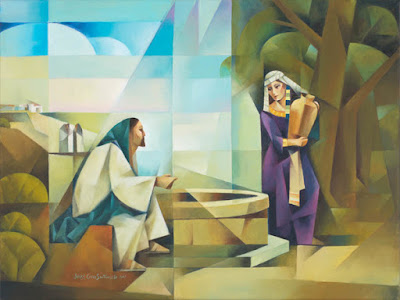“SITIO!”, I THIRST!
March 15 2020: Third Sunday of Lent - A
A Dutch proverb says, “Who has no thirst has no business at
the foundation.” Another proverb adds, “Water that has been begged for does not
quench the thirst.”
What do you thirst for?
When Jesus was on the cross, one of his last words, before
he died, was, “Sitio” in Latin, translated, “I thirst!” (Jn 19: 28). This is an
expression that each one of us thirsts for something. We all have expectations
in life. Who then, or what can satisfy our thirst?
We live in a world filled with so many expectations, hunger,
and thirst. The sad, however, is that many know not how to name their thirst,
or by feeling so thirsty, many feeds at any source, even in dirty waters. For
them, the most important seems to have something to quench their thirst, no
matter what it is.
Lent is a time to look deep inside the well of life. It is a
time to look deep within ourselves with truth and under the guidance of the
Spirit. For, the living water can be fetched only in the well of truth. And
Jesus, for us, is that well. Thus, he can say, “I am the way and the truth and
the life” (Jn 14:6).
In this third Sunday of Lent, we are called to name our
thirst and to come and feed at the fountain of living water. It is a call to
faith and prayer. Through the inner line of the three readings, not only that
point is set on the living water, but also on one of the spiritual exercises of
the Lenten triad that is prayer. Because we thirst for water, we need to raise
our voice to God in prayer, knowing that he alone can rightly satisfy all our
longings.
In that line, the first reading is the narration of the
experience of the children of Israel in the desert. At a certain point of their
exodus out from Egypt, when they thirst, “the people grumbled against Moses,
saying, “Why did you ever make us leave Egypt? Was it just to have us die here
of thirst with our children and our livestock?”
This page of the story of the people of God teaches us that,
when one thirsts for something, he loses all patience and even can lose
gratitude for what is already done for him. The people were taking out of
Egypt, release from slavery and set free. But for a simple thirst for water,
they grumble and accuse of having been brought into the desert to die. God,
however, heard the cries of the people and therefore, ordered Moses to strike
the rock and make flow from it, water to quench their thirst. This scene of the
Horeb which gave the emblematic names, “Massah and Meribah” to that place
expresses our daily cries to God, our grumblings, our thirsts, and our expectations.
Those expectations, when rightly directed to God in prayer,
we are assured that they will get a positive answer from him. Thus, St. Paul,
in the second reading can affirm, “hope does not disappoint, because the love
of God has been poured out into our hearts through the Holy Spirit who has been
given to us.” Moved by our faith, we know that only God can quench our deepest
longing for living water, our thirst for real life.
The Gospel, itself, is about that living water. The episode
of Jesus and the Samaritan woman is a great catechism in the discovery of
faith, truth, and life through prayer. At the starting point of the story,
Jesus seems to be the one who thirsts. He asked water from the woman. This is
the expression of God thirsting for us. The Catechism rightly states in its
article 2560, that God has a desire for us. He thirsts to have us know him and
be saved.
Then, the need is transferred. It is no longer Jesus, but
the Samaritan woman who expresses a greater thirst: “Sir, give me this water, so
that I may not be thirsty or have to keep coming here to draw water.” Like this
woman, we all have needs of God. We all have this inner longing to be
satisfied. It is only through prayer that we can reach that satisfaction.
Consequently, the same article of the catechism can state, “Whether we realize
it or not, prayer is the encounter of God's thirst with ours. God thirsts that
we may thirst for him.” It is our thirst that brought Jesus on the cross.
Therefore, when from the top of the wood of the cross he cries, “Sitio!”, the
Lord expresses in words, the reasons why he is dying. He is thirsting for our
life.
In Jesus, it is the living water that craves to quench the
aridity of the craving ground that is our heart. In this Lenten season, let us
not fail to make as our only prayer, the thirst to be satisfied by God. No
matter what you thirst for, voice it out to God in prayer: “Sitio!”
Brethren, at this time when many churches don’t have public
Masses because of the COVID-19, comes to mind that common dictum that, “we
realize the value of something only when we are deprived of it.” May this
suspension of public Masses bring us to recognize that the Holy Eucharist is the
sacrament that quenches our thirst for God. In the Eucharist, we truly attain
fulness of life, Jesus, the fountain of living water. Let us cry to him,
“Sitio!” for healing and protection. Do not panic, do not fear. Christ is our
life (Romans 8:31). Christ thirsts for our souls. May our souls also thirst for
Christ, and now more than ever.





Comments
Post a Comment